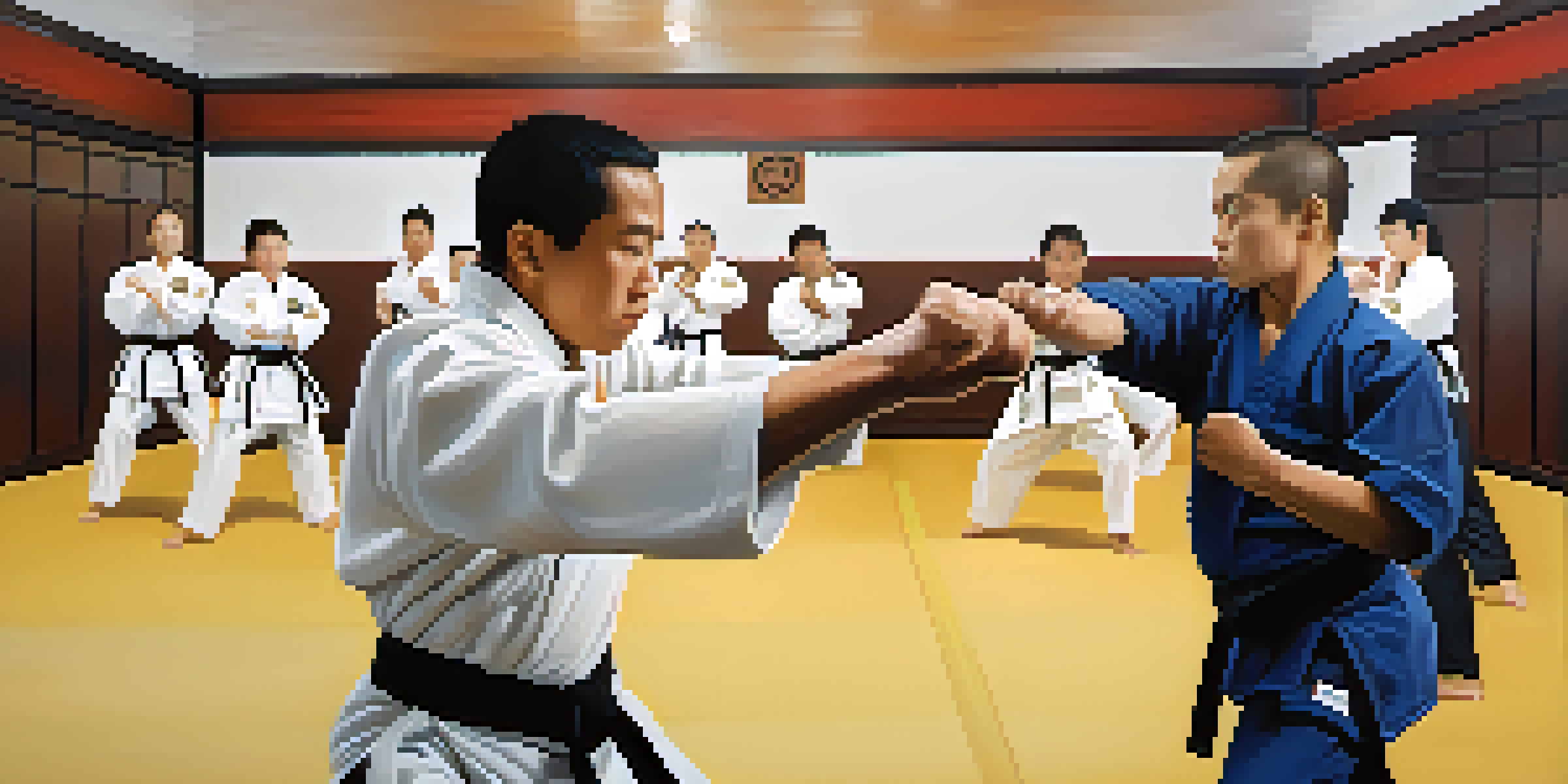Self Defense Techniques: When to Use Your Boundaries

Understanding Personal Boundaries in Self Defense
Personal boundaries are the limits we set to protect our emotional and physical space. They help us feel safe and respected in our interactions with others. Recognizing these boundaries is crucial when it comes to self-defense, as they serve as the first line of protection against unwanted advances.
Boundaries are a part of self-care. They are healthy, normal, and necessary.
When we understand our boundaries, we can communicate them clearly to others. This clarity can prevent many potential conflicts from escalating. For instance, if someone is standing too close for comfort, expressing discomfort can often diffuse a situation before it worsens.
Ultimately, knowing your boundaries empowers you. It allows you to assert yourself confidently and take necessary actions when those boundaries are violated. This understanding is the foundation of effective self-defense.
Identifying Violations of Your Boundaries
Recognizing when your boundaries are being crossed is vital for effective self-defense. It can range from verbal insults to physical encroachments. Every individual has a unique threshold, and being aware of yours is key to protecting yourself.

For example, if someone makes inappropriate comments or touches you without consent, these are clear boundary violations. Understanding these signs can help you react quickly and appropriately. Ignoring such violations can lead to more serious situations down the line.
Know Your Personal Boundaries
Understanding and recognizing your personal boundaries is essential for effective self-defense and emotional safety.
By being vigilant about your personal space and emotional needs, you can better prepare yourself to respond. This awareness is the first step in not only asserting your boundaries but also in taking action if necessary.
Effective Communication: The First Line of Defense
Communication is one of the most effective self-defense techniques. When someone crosses your boundaries, expressing your feelings and needs can often resolve the issue before it escalates. A firm 'no' or a clear statement about your discomfort can set the tone for the interaction.
The most important thing in communication is hearing what isn’t said.
For instance, if a friend is joking around in a way that makes you uncomfortable, addressing it directly can help them understand your limits. This proactive approach not only protects your boundaries but also fosters healthier relationships.
Remember, assertiveness in communication doesn’t mean aggression. It's about being clear and confident about your needs, which is a crucial skill in both self-defense and everyday interactions.
Physical Self Defense: When Words Are Not Enough
While communication is essential, there may be times when physical self-defense becomes necessary. If someone poses an immediate threat to your safety, knowing how to react physically is crucial. This doesn’t mean you should always resort to violence, but being prepared can make all the difference.
For example, learning basic self-defense techniques can give you the confidence to respond effectively in dangerous situations. This might include moves like escaping holds or blocking strikes. Understanding how to protect yourself physically enhances your overall sense of security.
Communicate to Protect Yourself
Effective communication of your feelings and limits can prevent situations from escalating and help maintain your boundaries.
Ultimately, physical self-defense should be a last resort. It’s important to assess the situation and determine the best course of action—whether that involves walking away, seeking help, or defending yourself physically.
Practicing Self Defense Techniques Regularly
Just like any skill, practicing self-defense techniques regularly can help you feel more prepared. Whether it’s attending a martial arts class or practicing with a friend, consistent practice builds muscle memory and confidence. This preparation can be invaluable when faced with a real threat.
Incorporating role-playing scenarios can also be beneficial. By simulating potential situations where your boundaries may be violated, you can rehearse your responses. This practice can help alleviate fear and increase your ability to react calmly under pressure.
Moreover, practicing self-defense techniques doesn’t only enhance your physical skills; it also reinforces your mental resilience. The more prepared you are, the more empowered you become in maintaining your boundaries.
The Role of Awareness in Self Defense
Awareness is a key component of self-defense and maintaining boundaries. Being mindful of your surroundings can help you identify potential threats before they escalate. This involves not just paying attention to people but also being aware of the environment around you.
For instance, when walking alone at night, staying alert can help you avoid risky situations. Simple practices like keeping your phone in your pocket and scanning your surroundings can make a significant difference. Awareness allows you to anticipate and respond to potential violations of your boundaries.
Practice Self-Defense Techniques
Regularly practicing self-defense techniques builds confidence and prepares you to respond effectively in threatening situations.
Developing this level of awareness takes practice, but it is well worth the effort. The more attuned you are to your environment, the better equipped you will be to protect yourself and assert your boundaries.
Seeking Support: Building a Safety Network
Building a network of support is an essential part of maintaining personal boundaries. Friends, family, or even community groups can provide safety and reassurance. Knowing that you have people who will back you up can enhance your confidence in asserting your boundaries.
For example, if you’re in a situation where you feel uncomfortable, having a trusted friend nearby can deter potential violations. This support system can also provide a sense of accountability, encouraging you to speak up when your boundaries are crossed.

Moreover, discussing your experiences with others can help you gain perspective and advice on handling similar situations. Remember, you don’t have to navigate boundary-setting and self-defense alone; support is a crucial element in your journey.